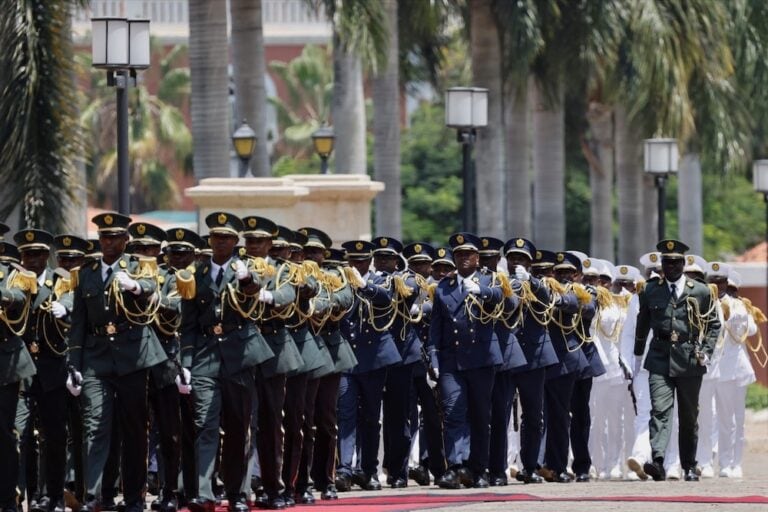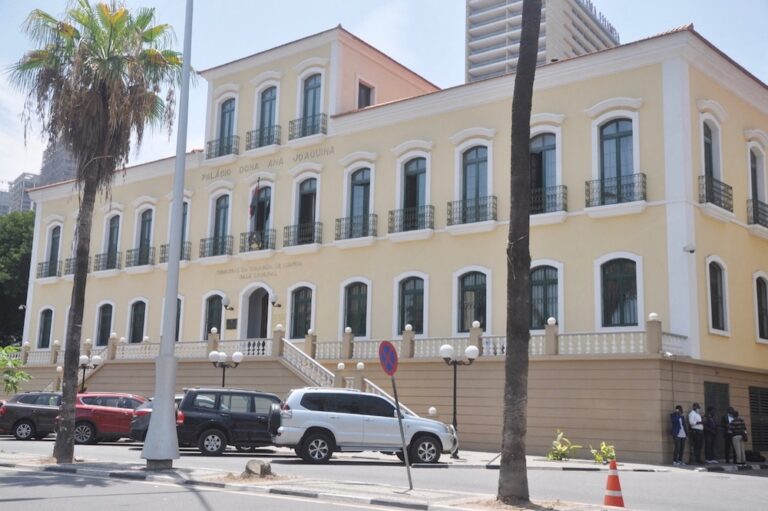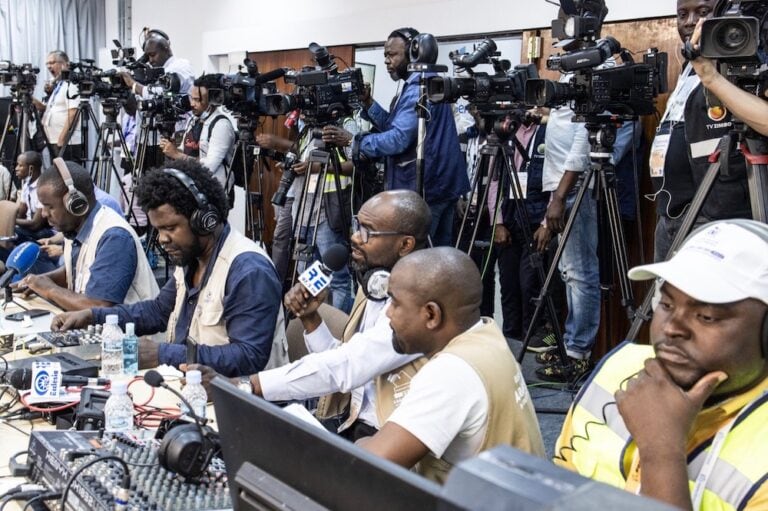Protest organiser António Alves Kamulingue called a Voice of America journalist and said that he had fled to a hotel in the city center because he was being followed and feared for his life. Kamulingue’s family members have not heard from him since that day.
(Human Rights Watch/IFEX) – Johannesburg, July 5, 2012 – The Angolan government is targeting protest organizers for arbitrary arrest and detention in response to increasing demonstrations criticizing the government or its policies, Human Rights Watch said today.
Human Rights Watch called on the Angolan authorities to release or appropriately charge all detained protesters and to ensure that all detainees have prompt access to legal counsel and family members. The authorities should urgently investigate alleged abductions and possible enforced disappearances of several protest organizers. Angola is scheduled to hold parliamentary elections on August 31, 2012.
“The recent spate of serious abuses against protesters is an alarming sign that Angola’s government will not tolerate peaceful dissent,” said Leslie Lefkow, deputy Africa director at Human Rights Watch. “The government should stop trying to silence these protests and focus on improving the election environment.”
Angola has experienced unprecedented public protests since 2011 as first youth, and now war veterans, have publicly demonstrated in the capital, Luanda, and other cities.
The youth movement has called for social reforms and the resignation of President José Eduardo dos Santos, now in power for 33 years. War veterans are demanding long overdue social benefits.
Over the past year, Angolan uniformed police and plainclothes agents have reacted to the youth protests with increasingly violent crackdowns, despite their small scale, and have arrested many youth leaders, journalists, and opposition leaders.
Public protests by war veterans have gained momentum since June. War veterans in Luanda and Benguela have announced more protests before the elections unless the government addresses their demands for regular pension payments. Many of the war veterans were demobilized over the last two decades from the armies of all sides, including the ruling party, in Angola’s long civil war. On June 7, several thousand war veterans marched to the Defense Ministry in Luanda, where the army chief of staff, Gen. Sachipengo Nunda, promised to address their pension claims.
On June 20, thousands of war veterans gathered at the military signals regiment headquarters in Luanda, following an official announcement that the government would disburse one-time payments of US$550 and address pension claims. War veterans who participated in the protest that day told Human Rights Watch that the protest erupted spontaneously after they did not receive any official response to their broader pension claims.
The war veterans marched through the city, stopping at the Catholic Radio Ecclesia and the United States embassy, and came close to the presidential area, until they were barred by squads of Rapid Intervention Police, military police, and presidential guards, who dispersed the crowd by shooting teargas and live ammunition.
Witnesses told Human Rights Watch that protesters were unarmed, but some participants threw stones and beat an Angolan army general who was at the scene, according to Human Rights Watch research. Human Rights Watch was not able to confirm allegations that three protesters were shot to death.
The security forces arrested and jailed more than 50 war veterans during the June 20 protest. Seventeen were allegedly released without charge on June 22, but the police, military, and judiciary authorities did not respond to Human Rights Watch’s repeated requests to confirm the total numbers of those arrested, released, or still in pretrial detention. On June 25, military police arrested a leader of a war veterans’ complaints commission.
Human Rights Watch research determined that at least 28 war veterans remain in pretrial detention: eight at the criminal investigation police headquarters and at least 20 at the military judicial police headquarters in Luanda. Police, military police, and court officials told Human Rights Watch that the detainees were permitted to request assistance from legal counsel, but had not done so. Family members of some detainees told Human Rights Watch they were allowed to bring food, but were not allowed to speak to their relatives.
Two war veterans who were detained for two days told Human Rights Watch that they were forced to declare on television that opposition political parties were behind the protests, and were then released without charge. They said that plainclothes security agents interrogated them separately without the presence of a lawyer at Luanda’s provincial criminal investigation police. They also said they were threatened with reprisals if they refused to tell the state-owned television, Televisão Pública de Angola (TPA), that opposition parties had incited the former soldiers to protest.
One of the two veterans, Francisco Candela, who was demobilized from former União Nacional para a Independência Total de Angola (National Union for the Total Independence of Angola, UNITA) rebel forces in 2003, said: “They told me that if I spoke out against the opposition parties they would resolve my situation. But if I didn’t accept they would convict me for rioting against the security of the state. ”
Candela added that the security agents drove him and another rebel war veteran in a civilian car to the military headquarters, where TPA journalists interviewed them in the presence of the security agents. The state media have since reported extensively about the alleged incitement of the protests by opposition parties. On June 16, the Angolan Armed Forces publicly accused the opposition parties UNITA, CASA-CE, and Bloco Democrático of having instigated an earlier protest by war veterans, on June 7 in Luanda.
Human Rights Watch also spoke by telephone with José Fernandes de Barros, a former member of the ruling party’s force, FAPLA (Forças Armadas Populares para a Libertação de Angola), and a signatory to a manifesto of a complaints commission that represents 4,000 war veterans awaiting their formal demobilization since 1992. De Barros was arrested on June 25 by military police and has since been detained at the Luanda military judicial police headquarters. He also said that military officials interrogated him without a lawyer present. The commission had previously planned a protest in February but called it off.
Angolan and international law requires immediate access for every detainee to legal counsel, who should be allowed to be present during questioning to prevent coercive interrogations, Human Rights Watch said.
“The Angolan security forces have made doubtful arrests of war veterans even more suspect by questioning them in the absence of legal counsel,” Lefkow said. “Interrogating detainees without the presence of a lawyer raises serious concerns of coercion.”
Possible Enforced Disappearances of War Veteran Protest Organizers
The arrests of war veterans on June 20 and 25 were preceded by the possible enforced disappearance of two organizers from an ad hoc group called the United Patriotic Movement (MPU), which had organized a protest by war veterans and former presidential guards.
On May 27, the MPU organized a protest of former presidential guards in Luanda to call for the payment of overdue salaries. The Luanda authorities had been notified, as Angolan law requires. Although the presidential guards withdrew their participation to await further negotiations with the president’s Military Office, other groups of war veterans joined the protest, which the security forces dispersed before it reached the presidential palace.
After the protest, an MPU leader, António Alves Kamulingue, called a Voice of America journalist and said that he had fled to a hotel in the city center because he was being followed and feared for his life. Kamulingue’s family members told Human Rights Watch that they have not heard from him since that day. They have sought information about him at many police stations and all prisons and hospitals in Luanda, but the authorities deny knowledge of his whereabouts.
On May 29, Isaías Cassule, another MPU member, was apparently abducted in Luanda’s Cazenga neighborhood. Alberto Santos, a former member of the presidential guard unit who is currently in hiding, told Human Rights Watch by telephone that he and Cassule had been called by phone to that meeting point by an alleged protester who claimed to have video footage of Kamulingue’s abduction. Santos said he saw six men, some wearing hats and sunglasses, drag Cassule into their car. Santos managed to escape. Cassule’s family members told Human Rights Watch they have not heard from him since. They had communicated his disappearance to the police and searched for him at police stations and hospitals.
Under international law, an enforced disappearance occurs when the authorities take a person into custody but refuse to acknowledge doing so or do not provide information about the person’s whereabouts or fate. Among the rights an enforced disappearance may violate are those to life, liberty, and security of the person, including protection from torture and other ill-treatment.
Threats and Reprisals Against Youth Activists and Protest Organizers
The organizers of the youth protests have also been targeted and threatened for their activities, Human Rights Watch said. All youth protest leaders who recently spoke with Human Rights Watch said they felt their lives were at risk.
On June 14, Gaspar Luamba, a university student and organizer of the youth protest movement, was abducted at noon by four men in civilian clothes at a university in Luanda’s Viana neighborhood. Luamba told Human Rights Watch that the assailants asked his identity and then ordered him to enter their car, warning him not to resist.
“They took me to a construction site of the Brazilian Odebrecht company and interrogated me for several hours,” Luamba told Human Rights Watch. “They displayed knives and pliers and threatened to use them. They asked me whether opposition parties were funding us and how much we wanted. They threatened me and my colleagues to take drastic measures if we declined to negotiate. But they didn’t hurt me.” Luamba said he was released several hours later.
Another youth protest organizer, Adolfo Campos, was attacked and threatened with death by two men in civilian clothes on June 12. He told Human Rights Watch: “Two Land Cruisers forced me to stop the car at 10 p.m. on the road. I left the car, and two individuals armed with a pistol and an automatic rifle beat me in my face with the weapons. I fell on the ground and one of them pointed his gun at me. The other one said: ‘Don’t kill him yet. Let’s go.’” He said the attackers ransacked the car, but only took his phone and left US$3,000 untouched.
A day earlier, on June 11, the well-known rapper and youth protest organizer Luaty Beirão was arrested by Portuguese authorities at Lisbon airport, after police detected a package of cocaine in a bicycle wheel, the only baggage he had taken on his flight from Luanda due to fears that the luggage might be tampered with. According to media reports, a Lisbon court quickly released Beirão from custody based on strong indications that Angolan police agents had placed the drugs in his baggage to incriminate him.
On May 23, at 10 p.m., in the second such attack in two months, 15 men in civilian clothes armed with metal bars and pistols attacked the residence of Dionísio “Carbono,” another youth protest leader, who was hosting a group of youth to discuss their new call-in radio program on the privately owned Rádio Despertar. Several of the youth were seriously injured and suffered broken bones, according to Human Rights Watch research.
“The increasing use of violence, threats, and other reprisals to silence protest organizers is alarming,” Lefkow said. “Angola’s regional and international partners should raise their voices and urge the government to stop the violence and respect basic rights.”


